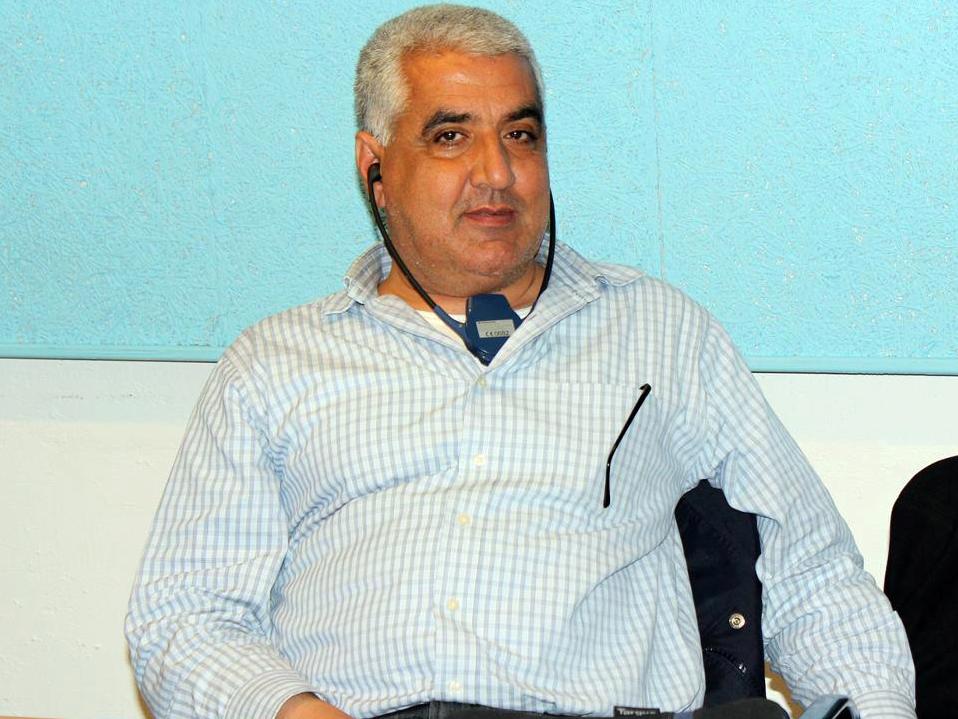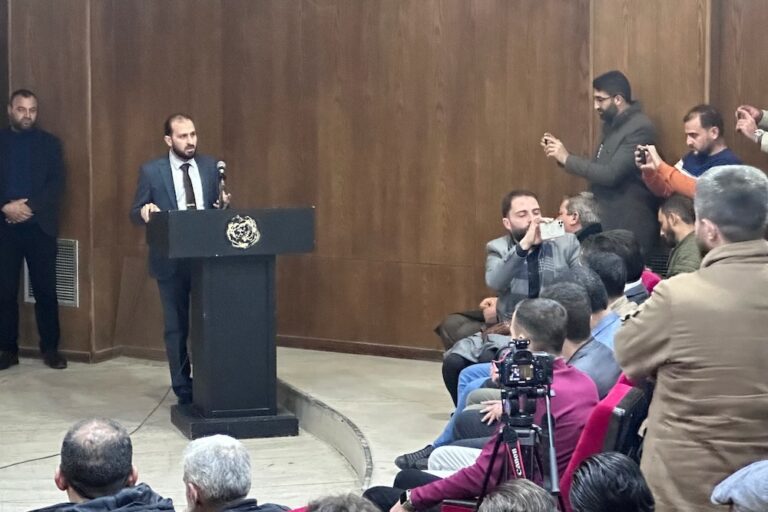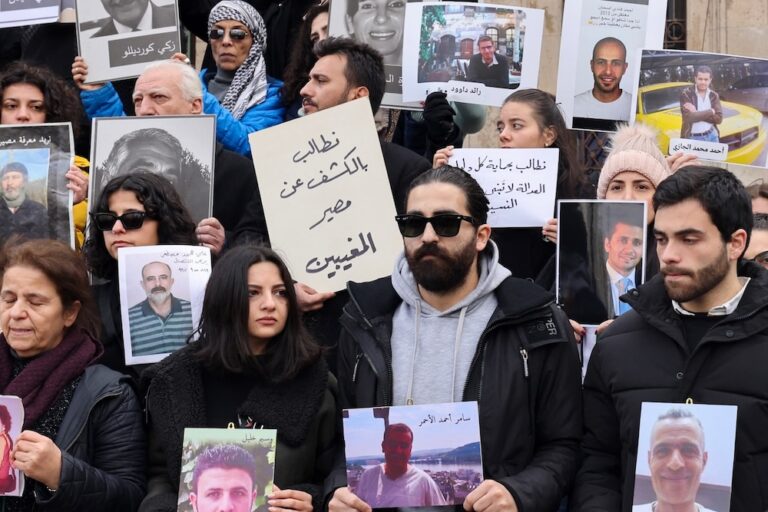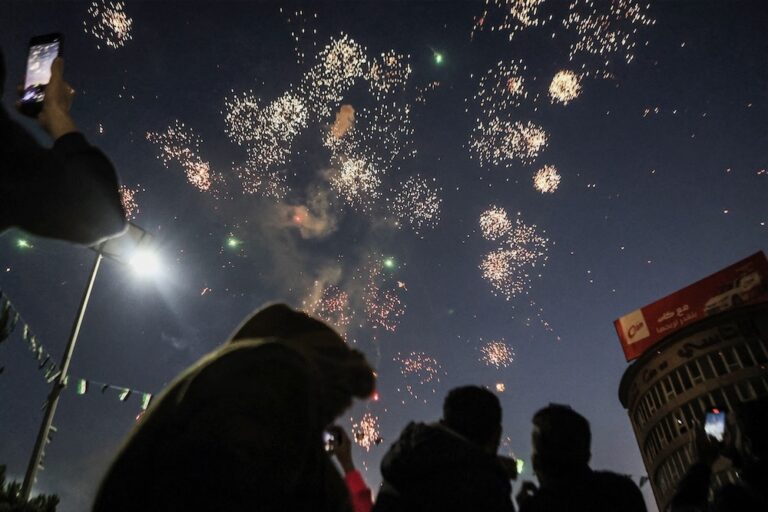Nineteen human rights organisations have joined forces to condemn the continued enforced disappearance of Syrian human rights lawyer Khalil Ma'touq whose health has been steadily deterioriating over the past eight months he spent in detention.
New information obtained by human rights organizations has heightened concerns about the secret detention and failing health of a prominent Syrian human rights lawyer who has not been heard from since his arrest eight months ago.
Khalil Ma’touq, the 54-year-old director of the Syrian Centre for Legal Studies and Research, was arrested along with his friend and assistant, 48-year-old Mohammed Thatha, on 2 October last year. It is believed they were detained at a government security checkpoint on their way to work in the capital Damascus.
They have been subjected to enforced disappearance as, despite repeated requests from family and lawyers, the Syrian authorities continue to deny they are in custody.
Such conditions increase the risk of their being subjected to torture or other ill-treatment, which is rife in Syrian prisons, the organizations said.
Two weeks ago, people close to the two men received a tip-off suggesting that Khalil Ma’touq was indeed in detention and that he was in extremely bad health. His health is seriously at risk as he suffers from advanced lung disease and has severe breathing difficulties. He takes regular medication and must be under constant medical supervision.
“While this report of Khalil Ma’touq’s presence in detention gives his family some sense of his fate after eight months of silence and denials from the authorities, the reports of his worsening health are very troubling”, the organizations said.
Because of his human rights work as executive director of the Syrian Centre for Legal Studies, Khalil Ma’touq was banned from travelling between 2005 and 2011. He wrote and published articles and legal studies in several newspapers and websites such as Al-Hiwar Al-Mutamiden. This included a research paper in which he analysed the connections between the International Criminal Court constitution and Syria’s Penal Codes.
Family members and colleagues of Khalil Ma’touq and Mohammed Thatha have suggested that their current detention may be related to this human rights work. Shortly before his arrest, Khalil Ma’touq had returned from a trip to France to obtain medical treatment, which may also have raised the authorities’ suspicions about him.
“Khalil Ma’touq must be given all medical treatment he requires. Both men must be given immediate access to their families and lawyers; these men are detained for their peaceful work in defence of human rights and they should be released immediately and unconditionally,” the organizations added.
In February 2013, in response to a request for information from a group of lawyers, a public prosecutor in Damascus denied that Khalil Ma’touq was being detained. However, detainees released at that time from the State Security branch 285 in Kafr Soussa in Damascus reported seeing him held there during that month.
In April, Khalil Ma’touq’s lawyer told Amnesty International that a State Security officer had informed him of his client’s transfer to an Air Force Intelligence branch in late March.
Since the tip-off about Khalil Ma’touq’s health earlier this month, nothing further has been heard about him or Mohammed Thatha. The authorities must urgently come clean about the whereabouts of these two men and the legal basis for their detention, the organizations said.
Khalil Ma’touq, a prominent human rights lawyer, has provided legal assistance to many victims of human rights abuses in Syria for many years. He has defended hundreds of political prisoners, journalists, and prisoners of conscience, including those tried by the Supreme State Security Court which fell far short of international standards of fair trial and was abolished in 2011.
In 2012, he was involved in the trial of human rights defender Mazen Darwish and his colleagues after they were arrested during a raid on the Syrian Centre for Media and Freedom of Expression (SCM) in February of that year. Torture and other ill-treatment has been widely documented in Syrian prisons and detention centres for decades, and is believed to have caused or contributed to the deaths of many if not most of the 1,300 individuals reported to have died in custody since March 2011 when anti-government protests first broke out. The situation has since evolved into an internal armed conflict across the country.
Tens of thousands of individuals in Syria have been arrested, often arbitrarily, in the same period, many of whom remain held, often in conditions amounting to enforced disappearance. Some have been referred to the Anti-Terrorism Court in Damascus, which began work in September 2012.
The 19 undersigned human rights organisations condemn the continued enforced disappearance of Khalil Ma’touq and his assistant Mohammed Thatha, and in light of new and existing information, call on the Syrian authorities to:
- Immediately and unconditionally release human rights defender Khalil Ma’touq and his assistant Mohammed Thatha, as they are both detained due to their legitimate and peaceful work in defence of human rights and are therefore considered prisoners of conscience.
- Immediately disclose the whereabouts and fate of Khalil Ma’touq and his assistant Mohammed Thatha to their families;
- Grant Khalil Ma’touq immediate access to any medical treatment he may require;
- Ensure both men are protected from torture or any other form of ill-treatment.
Alkarama Foundation
Amnesty International (AI)
Euro-Mediterranean Human Rights Network (EMHRN)
Front Line Defenders
Gulf Centre for Human Rights (GCHR)
Humanist Institute for Cooperation with Developing Countries (Hivos)
IKV Pax Christi
International Media Support (IMS)
Lawyers for Lawyers
Observatory for the Protection of Human Rights Defenders, a joint
programme of the International Federation for Human Rights (FIDH) and
the World Organisation Against Torture (OMCT)
SKeyes Center for Media and Cultural Freedom
Syrian Centre for Legal Studies and Research
Syrian Center for Media and Freedom of Expression (SCM)



